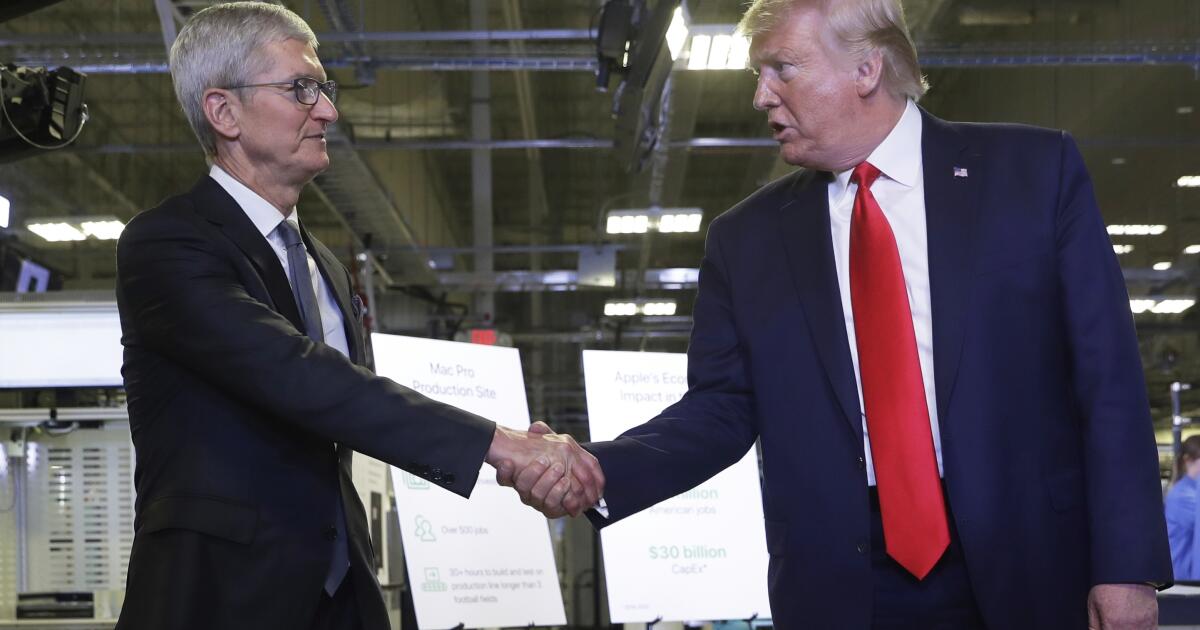
Apple, which was singled out by the Trump administration earlier this year over its production practices, took a further step to highlight its commitment to boosting investment in the U.S.
The tech giant pledged to spend an additional $100 billion on domestic manufacturing, a move that could ease tensions with President Trump who wants iPhones built in the United States.
Apple also said for the first time all of the cover glass on iPhone and Apple Watch units will be made in the United States at Corning’s Harrodsburg, Ky., manufacturing facility.
“We’re going to keep building technologies at the heart of our products right here in America because we’re a proud American company, and we believe deeply in the promise of this great nation,” Apple CEO Tim Cook said at a White House event.
Trump praised Cook before the tech mogul opened a white box with Apple’s logo, showcasing engraved glass before placing it on a base made of gold from Utah.
“This is the largest investment Apple has ever made in America and anywhere else and it’s just an honor to have you,” Trump said.
Apple said it aims to bring more of its supply chain to the U.S. as part of a new manufacturing program, confirming an earlier report from Bloomberg.
The company said in a new release it is working with Samsung, Applied Materials and Texas Instruments, among other businesses.
Apple’s commitment will increase its U.S. investment to $600 billion over four years as it seeks to avoid the cost of tariffs.
The Cupertino-based company announced a $500-billion U.S. investment commitment in February.
Nonetheless, Trump in May criticized Apple for expanding iPhone production in India, threatening to hit the company with a 25% tariff.
Trump said that his administration is placing a 100% tariff on chips and semiconductors, but if companies such as Apple are building in the U.S. “there’s no charge.”
Apple and other tech companies have touted their U.S. commitments, but analysts and economists have said shifting manufacturing to the United States could take years and result in higher prices for smartphones and other popular electronics.
Some analysts have said it would take at least five years for Apple to shift production to the U.S. and the prices of iPhones could reach $3,500 if the smartphone was made in America.
The iPhone 16 Pro is made up of roughly 2,700 parts sourced from 187 suppliers in 28 countries, according to an April report from TechInsights.
Cook said at the press conference that Apple’s iPhone will be made elsewhere for a while, but Trump said his administration might incentivize the company to bring that entirely back to the U.S.
As companies look to keep costs down and consumers watch their budgets, tariffs add another wrinkle to efforts to slash spending.
Taylor Rogers, a White House spokesperson, said in a statement, that the Trump and Apple’s announcement is “another win for our manufacturing industry that will simultaneously help reshore the production of critical components to protect America’s economic and national security.”
The move marks the latest apparent effort by Apple to show its commitment to hiring U.S. workers.
Last month, the smartphone leader announced the opening of its Apple Manufacturing Academy in Detroit. The program begins Aug. 19 and offers free workshops on artificial intelligence and advanced manufacturing to small and medium-sized businesses.
This isn’t the first time Apple has vowed to invest in U.S. manufacturing. In 2021, during the Biden administration, the smartphone maker said it would invest $430 billion over five years in the United States.
Tech companies including OpenAI, Taiwan semiconductor company TSMC and chipmaker Nvidia have tried to forge strong ties with Trump who has gone back and forth about tariffs.
Cook has been meeting with Trump and joined other tech executives who donated and attended the presidential inauguration earlier this year. Trump tapped Elon Musk, who runs Tesla and SpaceX, to lead a controversial effort to slash government spending. The White House hosted a crypto summit and released an AI action plan that benefits tech companies.
Apple has relied heavily on China to manufacture popular products such as the iPhone but has been diversifying its supply chain especially after the COVID-19 pandemic.
While there’s a perception that companies turn to China because of low labor costs, Cook has said the smartphone maker benefits from the skills possessed by tooling engineers there that’s needed to build a high-quality product.
Apple has more than 450,000 jobs with thousands of suppliers and partners across all 50 states.
While Apple designs its products in California, it also relies on a global supply chain involving various countries including China, Vietnam and India.
Apple is already spending more because of Trump’s tariffs. Last week, Cook said during an earnings call that the company has incurred roughly $800 million in tariff-related costs. Apple expects $1.1 billion in tariff-related costs in the fiscal fourth quarter ending in September.
Apple’s stock closed up 5% at 213.28 per share on Wednesday.



